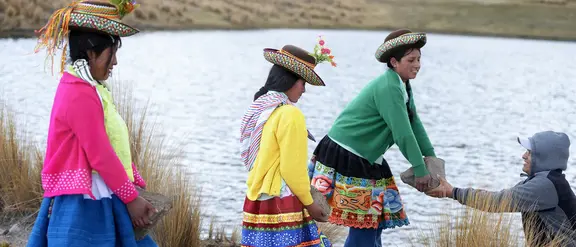Peru: Indigenous water management in the Andes
Glacial melt, extreme weather, and drought: The consequences of climate change are causing serious problems for farmers in the Andes. The community of Quispillacta is comparatively well-prepared, as it has long relied on the ecological knowledge of its ancestors.
Magdalena Machaca is worried. Climate change has forced farmers in the Andes to contend with extreme temperature fluctuations, and the glaciers are melting. "We live in the mountains," she says, "the snow up there has always been our natural water source. During the dry season, we rely on the streams and springs that appear as the snow melts. But many mountains are no longer snow-covered." Magdalena Machaca is an agricultural scientist, and Quispillacta—13 hamlets at an altitude of 2,500 to 4,500 meters—is her home. After completing her studies, she returned there and, in 1991, founded the Bartolomé Aripaylla Association (ABA) together with her sister, Marcela Machaca. Just one year later, they received support from Terre des Hommes .
The Machaca sisters rely primarily on the traditional ecological knowledge of the indigenous communities to improve water supplies, utilize specific plant properties, and thus increase the yields of farming families. "We spoke with the elders to find solutions to the problem of droughts," recalls Magdalena Machaca. "And we discovered qucha ruway —a practice that allows rainwater to be stored in lagoons while simultaneously preserving nature and biodiversity. We use clay, stones, and plant material for the dams. Certain algae promote seepage. Everyone helps with the construction, including the teenagers and children."
Defying the effects of climate change
ABA, together with the village communities, has now created more than 120 ponds and reinforced their banks to capture torrential rains. The water seeps into the deeper layers of the mountain and replenishes the groundwater reserves. The putaqa plant, with its long roots, draws the groundwater to the surface where it is needed. Many families have created such a "putaqa spring." "The lakes can at least partially replace the ecological function of the vanished glaciers," Magdalena says proudly. "This means that farming families can maintain their food production even during periods of drought. We have become more resilient to climate change."
Thanks to ABA, the issue of rainwater harvesting has also entered Peruvian politics. Several regional governments, which not so long ago frowned upon traditional knowledge and relied solely on mechanized agricultural methods, have recognized the success of the measures and decided to implement the ABA concept in other parts of Peru. Thus, the work of ABA and Terre des Hommes extends far beyond Quispillacta.
